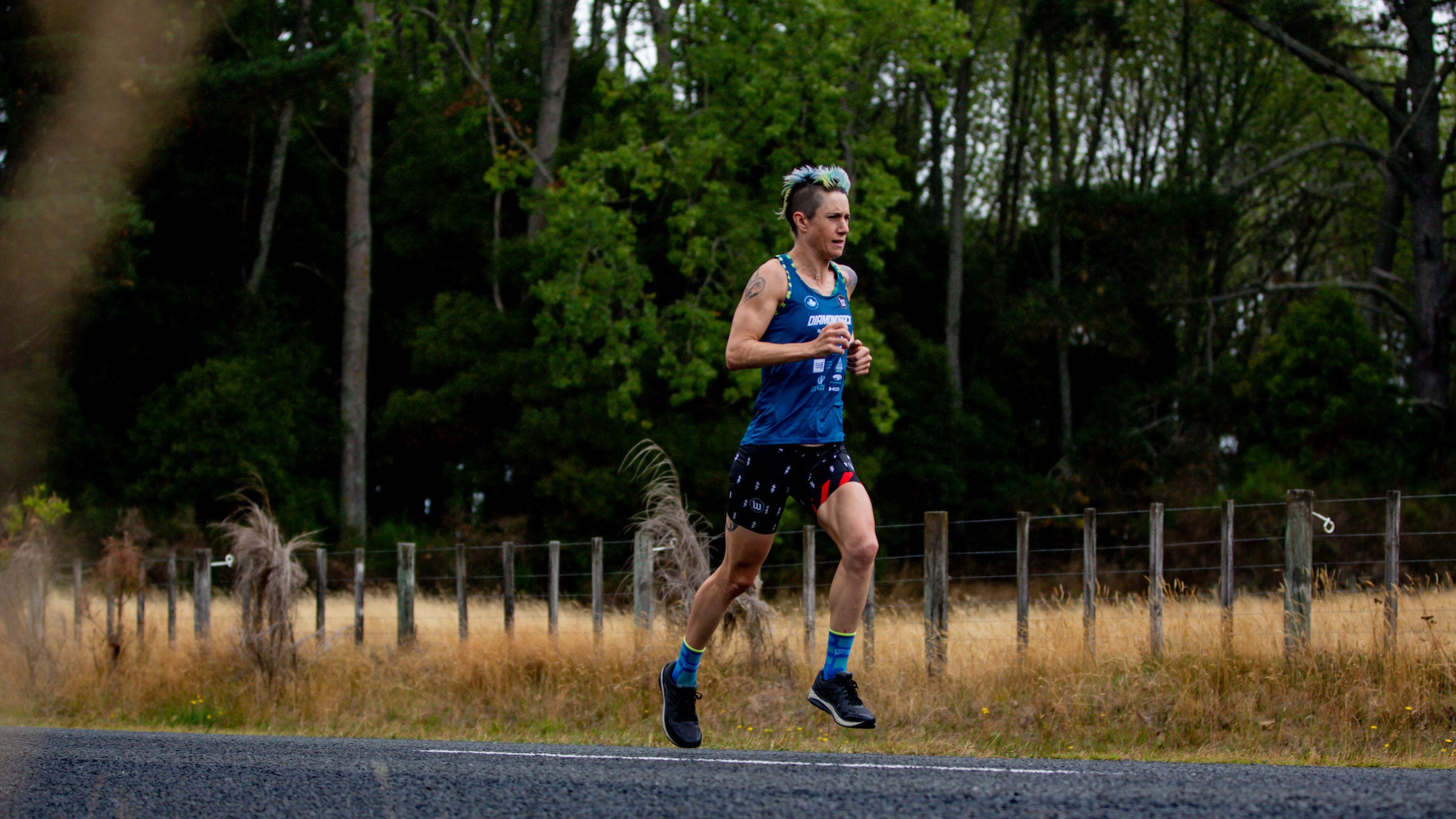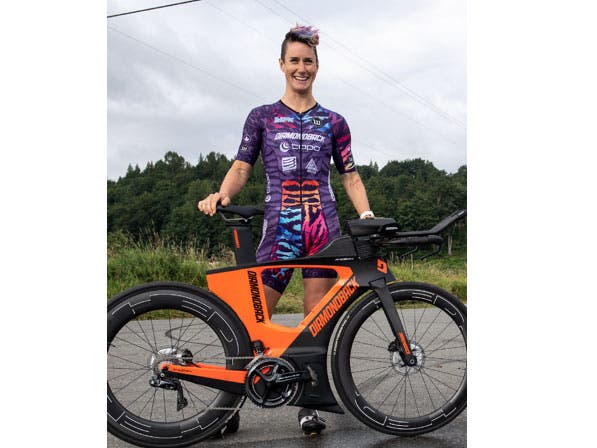Rach McBride Didn't Intend to Become a Non-Binary Gender Advocate for Triathlon

Go to Rach McBride’s website and you’ll see the phrase ‘the most interesting person in triathlon’ stretched across the home page in large white lettering. And perhaps the best word to describe McBride is, in fact, interesting. Take a look at some of the pictures splashed about the site while you’re there: There’s McBride, with a shock of close-cropped hair, dyed like a rainbow and styled in a spiky mohawk. There’s a chiseled body inked with several tattoos, including a tiger tail snaking down the right thigh–a nod to McBride’s nickname, “the Purple Tiger.” And a bio that includes, among other accolades, multiple 70.3 wins, two graduate degrees in genetics, a career in sexual health education, and accomplishments as a cellist.
But perhaps what makes the Vancouver resident even more intriguing is a narrative that is not mentioned in any bio or visible in any photos or race results. McBride, 42, recently came out as gender non-binary, a term most commonly used to describe those who do not fall within traditional categories of male or female. Sometimes called “gender non-conforming,” these individuals may identify as both male and female, as neither, as somewhere in between.
“Growing up, I didn’t realize there was any alternative outside of ‘boy’ or ‘girl,'” said McBride. “I first learned of non-binary identities when I came to university in my late teens and immediately felt a connection. Identifying solely as she/her didn’t fit.”
As a gender non-binary person, McBride, who was born genetically female, now uses the pronouns they/them–the identity, they say, that feels the “most honest.” McBride also started going by Rach.
Despite their undeniable boldness on the triathlon course–McBride is known to hammer the bike portion, lead from the front, and hang on for the run–the decision to speak up about gender came with some trepidation. First, there was the concern of making others feel uncomfortable–and the potential backlash from the sport, including their sponsors, who might not acknowledge gender outside the binary. Then, there was the need to reconcile the fact that they were competing as a gender non-binary person in a strictly binary sport. On most triathlon race registrations there are only two categories: male or female.
But McBride has never been one to be silenced by fear or possible judgment. After quietly testing the waters with new pronouns in their personal life for a few years, they finally spoke up at the Outspoken: Women in Triathlon Summit in Arizona this past November.
“I was actually scared of fully ‘coming out’ and committing to the work it takes to use they/them,” McBride said, but they were inspired by the journeys of transgender triathlete Chris Mosier and gender-nonconforming model Rain Dove. “But I realized I have the ability to affect change and inspire others outside the binary as well, and it became more important and honest for me to raise my voice and be open about my authentic self.”
McBride has been exuding that authenticity since their childhood growing up in Tacoma, Washington and later in Germany, when it was apparent early on that they were a “little different.”
“I have felt outside the binary my entire life. I was very androgynous as a child. My first recollection is getting my ears pierced at age five so that people would stop calling me a boy,” they say. “I was someone who [did not] fit into boxes so easily.”

Unwavering love from family, who supported and accepted them through a series of “different styles, ideas, careers, relationships, and hobbies,” as well as from their girlfriend, Steph, built a foundation of confidence that they draw from as both an athlete and now as their newfound–though somewhat reluctant–role as a leader in the gender-fluid movement in sport.
“I definitely do not purport to be an expert in this realm,” they say. “Tearing down the binary of sport is a tall order, and I think far from reality or what anyone wants at the moment. At this point there are not nearly enough athletes identifying outside the binary to provide a completely different non-binary category.”
Still, McBride, who will continue to compete against women in pro events when races resume, does have some thoughts on how triathlon can evolve to reflect a breadth of identities, starting with registration forms.
“I feel pretty uncomfortable being forced to choose either a M or F identity on race registration forms. Considering now many countries are including ‘X’ categories for gender on passports and other identification, it makes sense to start adjusting registration forms,” they say, citing a “really cool experience” at a small gravel bike race where participants were given a blank space to fill in their gender.
“You chose which race you wanted to enter: either the male race or the female race. Something as simple as that felt really inclusive, like I was seen and recognized. That was pretty huge,” said McBride. “Potentially just having an ungendered, ‘open’ category would be a cool idea. That would give space for folks not to have to choose ‘either/or.’”
McBride would also like to do away with gendered spaces at races, like port-a-potties and changing areas in transition specifically designated for women or men. “There is absolutely no need to do this,” they said. “Having universal, single-person changing spaces at races could be an option.”
As difficult as it may be to change the standards in a sport like triathlon–much less in society as a whole–McBride is up for the challenge. The reaction to their recent announcement was “astounding,” including resounding support from sponsors, fueling a desire to continue the conversation. If nothing else, McBride simply wants to put the topic on the radar of those who may not be aware of how to recognize non-binary athletes.
“What I’ve learned through my process so far is that there is a whole lot of understanding and support out there in the community. It may not feel like it, but in my experience a little education goes a long way,” said McBride. “Many people are very open to including non-binary folks and just may not know how.”
In the meantime, McBride hopes to encourage others, no matter their identity, to simply “be their true selves,” especially in sports.
“Be confident that you too do have a right to play and be recognized in sport. There is absolutely room for the inclusion and recognition of non-binary athletes,” said McBride. “Everyone has a right to participate in sport.”
Top photo: Witsup